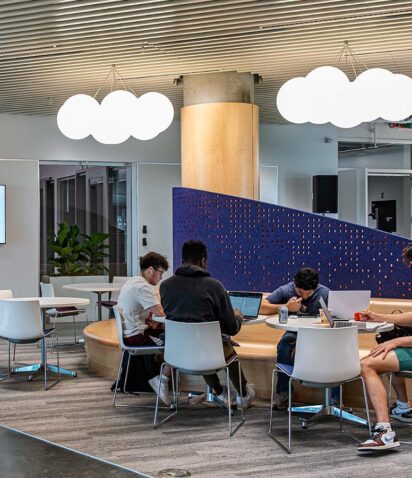Kempner Internship and Fellowship Program in Research Engineering
Our internship program offers a comprehensive, hands-on learning experience for current undergraduates and recent college graduates interested in preparing for successful careers in the field of AI/ML engineering.

About the program
The Engineering Intern and Fellowship Programs at the Kempner Institute at Harvard University offers a structured opportunity for enrolled Harvard College undergraduates (interns) and recent graduates (fellows) to further their experience in AI/ML engineering. These programs are designed to provide interns and fellows with a comprehensive, hands-on learning experience that prepares them for a successful career in the AI/ML field.
Engineering interns and fellows will interact directly with a member of the Kempner Institute Research Engineering team to advance their skills and understanding of advanced technologies. This includes developing cutting-edge AI/ML models and datasets; learning how to take advantage of unparalleled computing resources in the academic environment by optimizing AI/ML models including scaling models across a large set of GPUs; building or optimizing LLMs to tackle new, complex tasks; developing new models of brain circuits and function; and learning software engineering best practices including how to develop and disseminate reliable, reproducible open-source AI/ML scientific software packages.
Each intern or fellow will be assigned a mentor from the Research Engineering team, and their efforts will be overseen by our Lead Technical Project Manager.
Products resulting from the intern or fellows activities such as code, models, or datasets, may be published on Kempner Institute public channels, including GitHub, Hugging Face, or our Research Blog.
Participants will have the opportunity to engage in projects that will enhance their skills and understanding of advanced technologies.
Training opportunities may include:
- Contribute to developing and improving innovative AI/ML models and datasets.
- Help to optimize AI/ML models to improve accuracy and computational efficiency, ensuring they are scalable and robust.
- Participate in the creation or optimization of LLMs, including developing evaluation benchmarks tailored to various tasks.
- Learn and apply best software engineering practices suited for AI and ML development.
- Design and implement AI workflows that run efficiently on AI HPC clusters.
- Enhance the reproducibility of AI/ML workflows, ensuring they are ready for both on-premises and cloud environments (cloud readiness).
- Engage with the open science community by helping to develop and disseminate open-source AI/ML scientific software packages.
- Gain experience in multi-node distributed GPU training to enhance the performance of distributed AI/ML workflows.
- Work on the numerical aspects of AI/ML algorithms to maximize efficiency and performance.
- Get hands-on experience with data engineering tasks such as managing data warehouses, data lakes, and data processing pipelines.
- Develop skills in technical project management.
The program is fully on-site, in person, at the Kempner Institute, 6th floor, Science and Engineering Complex in Allston, MA. Remote work is not possible in this position. Applicants must be legally eligible to work in the United States. We are not able to provide visa sponsorship for this position.
Harvard is an equal opportunity employer and all qualified applicants will receive consideration for employment without regard to race, color, sex, gender identity, sexual orientation, religion, creed, national origin, ancestry, age, protected veteran status, disability, genetic information, military service, pregnancy and pregnancy-related conditions, or other protected status.
Basic Qualifications
- Proficiency in coding (Python) and deep learning frameworks (PyTorch) with a drive to enhance these skills.
- Familiarity with one of the AI/ML fields like Natural Language Processing, Computer Vision, Reinforcement Learning, generative models, or a strong interest in exploring them.
- Basic data preprocessing, feature engineering, and model evaluation, or a strong willingness to gain hands-on experience.
- Eagerness to learn HPC concepts, including parallel computing, distributed systems, and optimization.
- Analytical skills, problem-solving abilities, and a growth mindset.
Internship in Engineering for enrolled Harvard college students (interns):
- Applicants must be enrolled full-time in a degree granting program at Harvard College.
- Summer: the program requires a commitment of 35 hours per week for 10 weeks.
- Academic term: the program requires a commitment of 10-15 hours per week for the duration of the academic term.
- Students who demonstrate successful performance may be able to extend the internship for additional academic or summer terms.
Fellowship in Engineering for recent graduates (fellows):
- Applicants should be within three years of graduation from a bachelor’s or master’s degree at the time of application.
- The fellowship program is a full-time (35-hour per week) position.
- The fellowship requires a minimum 6 month commitment, which is typically renewed for an additional 6 month term based on satisfactory performance and mutual interest.
Compensation
Interns and Fellows are paid on an hourly basis according to their highest level of education.
Candidate applications are reviewed on a rolling basis throughout the year. The hiring committee will select applicants based on the nature of the projects and their qualifications as described in their application.
If selected, candidates will move through a two-step interview process:
Light Technical Interview: This interview round assesses the applicant’s basic understanding of AI/ML research and engineering, and includes basic data structure and algorithm coding questions. If successful candidates will be invited to a final interview.
Final Interview: Conducted with a senior engineer and/or members of the Kempner Institute Leadership team, focusing on the applicant’s fit within the team and their potential contributions to the Kempner Institute projects.



